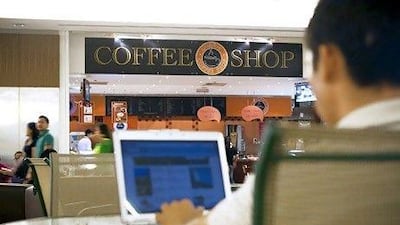A lack of trust in online payments is the primary reason why just 6 per cent of Middle East internet users regularly shop online, a survey shows.
Despite a barrage of daily deals sites having launched in the region - including Groupon, Cobone and GoNabIt - most people in the region do not buy products or services via the Web.
According to a survey by Real Opinions, a market research company based in Dubai, 43 per cent of Web users have been deterred from shopping online because they do not trust payment systems.
A lack of suitable payment options, the low number of online retailers, unreliable delivery and poor website design were also cited as barriers.
Dan Healy, the chief executive of Real Opinions, said the reluctance to shop online was down to perceived fears, rather than the actual dangers of online fraud.
"It's perception management. The industry should be reassuring people more as to the security behind online transactions," he said.
Mr Healy said it was a "shared responsibility" between banks, credit-card issuers and online retailers to allay fears about online shopping.
Industry experts agreed the problem was down to negative perceptions rather than actual dangers.
"Technically, it is more dangerous to [use] your credit card in a restaurant than online," said Ari Kesisoglu, Google's regional manager for the Middle East and North Africa. "Online is significantly more secure than the traditional methods … There are so many encryption technologies."
Just 6 per cent of Web users in the region said they regularly buy products and services online, with 27 per cent saying they occasionally made purchases, according to Real Opinions.
That means 67 per cent of Middle East internet users never make purchases online. Given that the survey was conducted on the Web, the proportion of the total population - including non-internet users - that has never transacted online would be significantly higher.
Despite this, there is high demand for shopping online. The research found that 39 per cent of regional online users intend to make purchases over the Web but are not yet doing so, marking a great opportunity for regional businesses, said Mr Healy.
"This is going to help small and medium businesses who have limited choice in how to expand their businesses. It has enormous potential," he said. "There is a tremendous opportunity in the Middle East for e-commerce to grow, particularly for UAE businesses to expand their marketplace from 3.5 million in the UAE to over 70 million in the region."
According to JPMorgan, global e-commerce revenues are forecast to grow to US$680 billion (Dh2.49 trillion) this year, up by 18.9 per cent from last year.
But Middle East businesses are missing out on this growing industry by not providing online retail services. Just 5 per cent of UAE companies use the Web to sell their products or services, while only 11 per cent make purchases online, a survey by the Telecommunications Regulatory Authorityshowed.
According to Internetworldstats.com, there are almost 72.5 million internet users in the Middle East, representing just a third of the total population.
Mr Healy said he believed this figure underestimated the true number of internet users in the region, meaning the opportunity for online retail businesses was even greater.
"We think that the number of people who are able to access the internet in the Middle East is underestimated in the official figures, because of access to free Wi-Fi, shared devices and internet cafes," he said.
Mr Kesisoglu said he expected acceptance of e-commerce to grow, posing an opportunity for entrepreneurs.
"As the users start to see the benefits of online in general, they're going to start using this more and more often," he said.
"Where a lot of people are seeing problems, some people are seeing opportunities."

